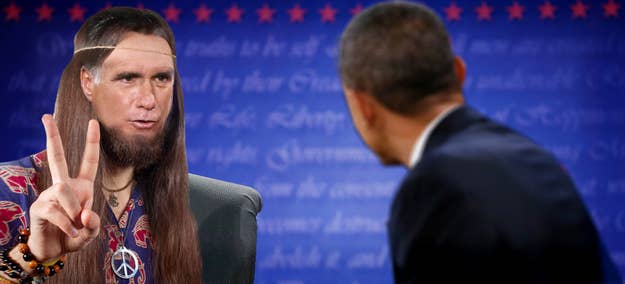
BOCA RATON, Fla. — Mitt Romney strained Thursday to reassure voters that he won't rush America to war, a studied reversal from the unapologetically hawkish persona he has presented for much of the year.
It was a performance that served, in many ways, as the grand finale to his monthlong march to the middle: A foreign policy debate where Romney presented himself as a new kind of peace-and-love Republican, whose softened rhetoric appeared to be defined in opposition to the hawkish — and deeply unpopular — neoconservative policies of the Bush years.
Every answer he gave was infused with this new tone. Speaking of the Middle East, Romney declared, "We can't kill our way out of this mess." In Syria, he said he was committed to removing Assad from power, but definitively ruled out the use of military force. And on Iran — which Romney has repeatedly identified as the country's greatest threat — the Republican took pains to insist he had no interest in going to war with them, insisting he would "only consider it if all of the other avenues had been tried to their full extent." One of those potential avenues, he suggested for the first time in the debate, could be the United Nations indicting Iranian President Mahmoud Ahmadinejad.
Overall, Romney's decidedly dovish nods toward military restraint — his advisers in the spin room afterward preferred "peace through strength" — comprised an appeal to a war-weary country that still has tens of thousands of troops in Afghanistan.
"We want people to be able to enjoy their lives, and know they're going to have a bright and prosperous future, not be at war," Romney said. "That's our purpose."
After the debate, Romney's aides and surrogates insisted this philosophy had been at the center of his foreign policy all along. And if the tone seemed noticably softer since the tough talk of the primaries, it was only because he was trying to fight an unfair caricature, drawn by the Democrats, that he was a Republican warmonger, surrogates said.
"The Democrats are trying to push this idea that's false. I even heard it here in the spin room before the debate, this idea that, 'Oh, we can't go to war, that can't be our answer' — as if that's Mitt Romney's answer!" intoned campaign adviser Bay Buchanan. "It's not! It never has been.They've been misleading people into believing it."
President Obama himself alternated throughout the debate between casting his opponent as a neophyte, and as an extremist hawk, arguing that Romney has "often talked as if we should take premature military action."
Buchanan offered a full-throated rejection of the notion. On the question of a Syria intervention, for instance, she said, "I think what Mitt Romney made extremely clear was war is not the answer. We're not going to take military into Syria. That would be foolhardy."
Republican National Committee chairman Reince Priebus similarly suggested that Romney had to use Monday night to push back against a false narrative that he would be a reckless, trigger-happy commander-in-chief.
"He used 90 minutes of unfiltered debate time to show Mitt Romney is not who President Obama has been trying to portray," said Priebus. "That in fact Mitt Romney is intelligent, reasonable, and presidential."
Senator Kelly Ayotte, an increasingly visible surrogate for Romney on foreign affairs, added, "The president would like to tie Mitt Romney to every single policy of the Bush administration. Mitt Romney is going to be his own man."
One Republican close to the campaign said the appeal to peace-making on display Monday night was part of a larger message they've been crafting since August.
"It's just like the convention," the Republican said. "It's the 'we're not Bush, we're not crazy' argument."
But as Romney continues to see his polls climb as he sashays toward the political center, Obama's campaign has grown increasingly vocal in calling him out on perceived flip-flops. Monday night was no exception.
"His previous rhetoric has been full of bluster, been full of taking tooth," said Michele Flournoy, a foreign policy adviser to the president. "His criticism has implied that he would be quicker to use force. You saw him backpedal. A picture of a constantly changing position... That doesn't cut it as commander."
